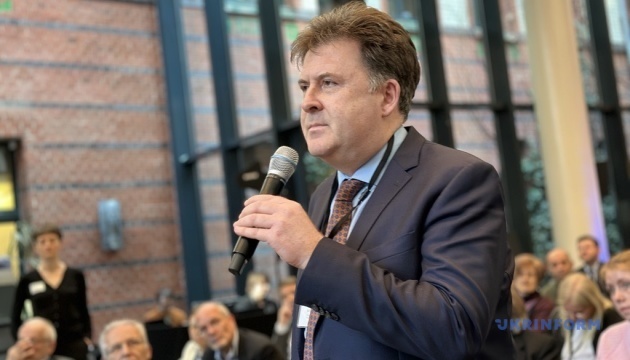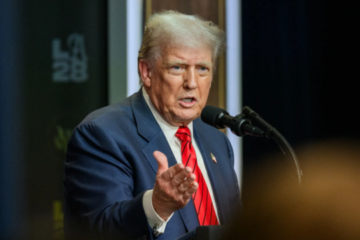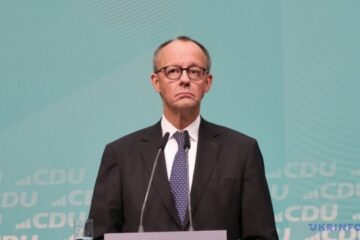
U.S. President Donald Trump wants a quick agreement to end the war in Ukraine and may therefore try to increase pressure on Kyiv and Europe, which must not allow a wedge to be driven between themselves and the United States.
This was stated in a comment to Ukrinform by Wilfried Jilge, a mediation adviser on Ukraine at the Center for International Peace Operations, an associate fellow at the German Council on Foreign Relations (DGAP), and a historian.
“It is becoming clear that Trump wants a quick ‘deal’ without sufficient preparation, which will make it difficult for Ukraine and Europeans to properly represent their interests… In addition, Putin wants to divide Europeans and Ukraine on one side and the U.S. on the other,” Jilge noted, recalling how Putin called on European capitals at a press conference last Friday to “constructively support the talks in Alaska and refrain from provocations and intrigues” that could undermine the progress achieved.
Jilge noted that given Trump’s advice to the Ukrainian leader in an interview with Fox News to conclude an agreement and his statement that Russia is a “great power” and Ukraine is not, it appears that the U.S. President has abandoned his demand for a comprehensive ceasefire as a prerequisite for the start of negotiations, and there is a risk that the Trump Administration will again blame President Zelensky if Ukraine cannot agree to points that may have long been prepared or agreed between the Trump Administration and Moscow without Ukraine’s involvement.
According to the expert, it is also becoming clear that Trump did not take seriously or at least partially ignored some of the principles that the Europeans and Ukraine tried to convey to him last Wednesday.
According to the expert, the meeting in Alaska also demonstrated that Trump and Putin have completely different goals and interests: Trump wants a quick peace and a Nobel Prize, as well as a quick solution to the problem of Russia’s aggressive war. At the same time, normalizing relations with Moscow seems more important to Trump and his team than Ukraine and a just peace. Jilge is convinced that Trump wants to leave the consequences of the “deal” to the Europeans.
Putin, on the other hand, is pursuing not only short-term but also long-term goals: he wants all of Ukraine. The “deal” is just one element of avoiding a conflict with the U.S. while creating favorable conditions in the war to drag Ukraine into his sphere of influence or completely subjugate it. Putin wants to make Russia a world power again, on par with the U.S. and China. To achieve this, he needs better relations with the U.S. and dominance in Europe.
“Trump and his team have not understood or do not want to understand that this is a threat not only to security in Europe but also to the U.S.,” the expert warned.
He is also concerned that Putin and his team probably took advantage of the opportunity to present their view of the causes of the “crisis” in Alaska in the absence of Ukraine and the European leaders.
“And there are signs that he has succeeded… Given that understanding of the Kremlin’s views on Ukraine is widespread among Trump’s team and some of his supporters, and experience with Russia is limited, there is reason to fear that Putin may have succeeded,” Jilge believes.
To back up his words, he recalls how Putin said that Russia recognizes the efforts of the U.S. Administration and President Trump personally to achieve a resolution of the “Ukrainian conflict” and his “desire to get to the heart of the matter and understand its causes.”
With the meeting in Alaska, Putin has gained extra time and is continuing the war without fear of tougher consequences from the U.S. soon, Jilge said. Negotiations directly on a peace agreement, rather than the start of negotiations only after a comprehensive ceasefire, could also make it easier for Putin to gain extra time.
At the same time, the analyst added, there is some positive news. For example, German Chancellor Friedrich Merz said after a further telephone conversation with Trump that the U.S. would participate in security guarantees for Ukraine, while Italian Prime Minister Giorgia Meloni announced that Trump had accepted Italy’s idea of collective defense for Ukraine, similar to NATO’s Article 5, which does not provide for Ukraine’s membership in the Alliance and, as reported in the media, will only be provided if Zelensky signs a peace agreement. The same applies to the news that Putin is allegedly ready to negotiate based on the current front line, although important details are still missing here, Jilge acknowledges.
He recommends that Europeans now stand firm on their principles and further strengthen their unity. They must expand and accelerate military support for Ukraine, especially now: this applies, for example, to air defense systems and the supply of long-range weapons. Ukraine’s existing long-range capabilities, such as medium-range missiles and missile-type drones, should be scaled up by financing (with less red tape) Ukraine’s industrial capacity. This has already been agreed with Germany, for example. More effective sanctions and measures against the Russian energy sector are also important, especially concerning Russian oil exports via the Baltic Sea.
However, the expert acknowledged that greater military support and sanctions could lead to disagreements with the U.S. Administration, which now wants to finally conclude a “deal.”
“Nevertheless, Europeans must stand firm and make it clear to Trump and his Administration that this is about people (in the territories occupied by Russia), not just territories, and that only a strong and just peace for Ukraine serves European and international security, and therefore the interests of the United States. If this does not happen, Trump will go down in history not as a peacemaker, but as a weak President who repeatedly allowed himself to be used by a ruthless imperialist,” Jilge stressed, adding that it has not become easier for Trump to prove that he is a strong leader after Alaska.
He noted in this context that Putin, the perpetrator of an aggressive war who is wanted by the International Criminal Court with an arrest warrant, was welcomed in Alaska with all the protocol honors and was able to break through his international isolation, which in itself was a success for the Kremlin. The expert noted that Putin had successfully positioned himself as a constructive partner who “wants to solve the problem” and thus managed to maintain and even stabilize the relations established with Trump’s team. Trump, for his part, is unlikely to be ready to impose even tougher sanctions against Russia or further secondary sanctions after the summit, which he described as a “very warm meeting.”
As reported by Ukrinform, European Commission President Ursula von der Leyen will travel with Zelensky to Washington. German Federal Chancellor Friedrich Merz, NATO Secretary General Mark Rutte, and Finnish President Alexander Stubb will also visit Washington.
Photos taken by Ukrinform can be purchased here.



